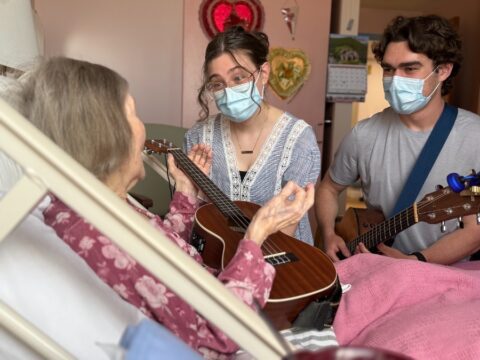I remember the tears swelling in my four-year-old eyes as my white classmate spit out the White Rabbit candy I brought for our school’s “Multicultural Day” in kindergarten. Although I didn’t have the words, it was then that I learned I was different and being different wasn’t good.
Growing up in predominantly white and evangelical Christian communities, I was ashamed of being Chinese and queer. Western beauty standards and heteronormativity were prevalent at my school, communities and in the media.
I was taught to pinch the bridge of my nose in hopes of a straighter one. I was taught that being gay was wrong and shameful. I internalized these messages for many years, believing that being whiter and straighter was better.
It was during my job in Christian ministry — in which I had to sign a sexual conduct policy “forbidding homosexuality” — that I finally admitted my queerness. This pushed me to question everything I believed about myself and my faith.
Does God still love me? Am I going to hell? Can I be queer and Christian?
It was in this painful and confusing place that I began decolonizing and deconstructing my faith, sexuality and later, racial identity. How could I identify with a religion that was built on colonialism and white supremacy? How could I be part of a faith that harmed queer and racialized people like me?
I cringed thinking of the mission trips I went on and the white televangelists in their fancy suits who spoke “truth.” I felt the pain and weight of colonization that queer and trans racialized communities experience.
After leaving Christian ministry, I started a master’s degree in gender studies. I opened myself up to other ways of thinking and being, learning from queer and trans racialized writers, activists and theorists. Instead of being afraid to tell Christians about my sexuality, I was scared to tell queer and trans people about my faith. Many of them had been harmed by the church and Christians.

I wasn’t sure how I could hold both my queerness and faith. To add to the complexities, exploring my queerness also gave me permission to decolonize my racial identity.
For many of us who grew up in the church, struggling with our sexualities and gender identities often takes our focus first. We’re simply trying to exist and survive. This left me without the emotional capacity to make sense of my racial identity, even though I was constantly exoticized, stereotyped and the target of anti-Asian racism.
When I moved back to Toronto after grad school, I met more queer and trans people of colour — including queer and trans racialized people of faith — who affirmed my identities and understood my experiences in Christian communities. With them, I felt a sense of home where I didn’t have to hide my queerness, culture or faith.
More on Broadview:
- Black youth are helping United churches create a safe, diverse space
- Hockey has a racism problem. These Canadians are trying to fix it.
- New Halifax church creates a space where queer people are the majority
I also found healing when I met other queer Asian friends. With them, I started to learn Cantonese, played mahjong and watched Asian films. We talked about our families, intergenerational trauma, growing up in white communities and reclaiming our culture — often over dim sum or noodles.
Several years ago, I spent Lunar New Year with my queer Asian friends at a restaurant that gave out White Rabbit candy after our meal. I teared up thinking of my younger self who watched someone spit out her culture. Now, I was celebrating the new year with those who understood me.
This Asian Heritage Month, I think about how far I have come. I think about what I have decolonized and deconstructed, what I have relearned and reclaimed.
The parts that used to bring shame, now bring healing. The sound of aunties speaking loud Cantonese on the TTC. Eating chicken feet at dim sum with queer Asian friends. Sharing stories about praying to our ancestors and connecting deeper with our culture.
My queer Asian communities bring me so much joy and healing. I am proud of all the ways we resist and liberate each other, simply by existing.
***
Jenna Tenn-Yuk is a writer, speaker and EDI consultant in Toronto.















I’ve never liked the taste of white rabbit, in fact I have also spit out tasteless rice candy. Give me a package of Bin Bin and I could eat it in a day. (MSG and all)
I will also spit out dubbel zout licorice. Does this mean I hate those who are Dutch?
Being ashamed of who you are, lets me know that you do not regard God’s creativity, and you think God has created something less than perfect.
Christianity is not built on colonialism and white supremacy. Christianity was high jacked to promote the agenda, and now provides another excuse for people not to believe in Christianity.
Your story is sad in a way, you’ve turned to a specific culture to find support, rather than looking for a Christian Church, that would provide a much better support.